- Home
- David Lubar
Lay-ups and Long Shots Page 4
Lay-ups and Long Shots Read online
Page 4
The Pagan River was running browner and higher than I’d ever seen it. I was a little nervous at first, especially since I didn’t have exactly the right boat for it. The only kayaks we had were what they call “play boats,” made for river surfing and doing tricks. They look more like big plastic potato chips than like kayaks—potato chips with bubbles in the middle, where the deck is high enough to fit your knees under.
It wasn’t long before I mostly got over being nervous. We were careful. We would paddle one rapid at a time, then get out to look over the next one. This made it easy for Melissa, who was on foot, to keep up.
There was no path, so she was scrambling along the bank, ducking under branches, hopping from rock to rock. Some people would have been annoyed, or bored, or both, but no, she was into it, clapping and cheering us on in the harder rapids. She was wearing hiking boots, and khaki shorts, and a flannel shirt with the sleeves cut off, and she looked pretty great.
Near the end of the run we came to the biggest rapid, the one we called “Barbed Wire,” because of a stretch of old fence along the shore. We got out of our kayaks and climbed up the bank to take a look. The water slid over a smooth, wide ledge of stone, fell at about a forty-five degree angle, then kicked up into a couple of good-sized waves as it flowed into the deep pool below. It was a good drop, though pretty straightforward.
But I saw another possibility. “Hey, look,” I said, pointing. “The water’s high enough, you could take that route on the left.”
“Straight into the shore,” said Jodie.
“No, you make a big turn, then down that sort of ramp, there.”
“Maybe,” said Jodie. “I like the straight way. Direct. That’s the kind of girl I am.”
We laughed. Jodie was short, and muscular, and athletic, and yes, pretty direct.
Justin and Melissa and I watched as Jodie launched herself off the drop, disappeared for a moment into the big wave at the bottom, and then surfaced in the slower water.
“Yee-ha!” shouted Jodie, raising her paddle over her head.
“My turn,” said Justin as he fitted himself into his kayak. And then over he went, too, down the drop, through the wave, into the pool below.
“They make it look easy,” Melissa said to me.
“Yeah. It is pretty easy.”
“Are you going to try that other way?”
I hadn’t planned to, until she asked. But she sounded so hopeful.
“Sure. I don’t want you to get bored,” I said.
“All right!” she said, nodding.
I was feeling happy and excited as I slid into the cockpit of my kayak and snapped on my sprayskirt. I didn’t say, “Okay, watch this!” as I pushed off into the current. I was thinking it, though.
It’s hard to say why I wanted to impress Melissa. She was Justin’s age, two years older than I was. And she was only visiting for a week or two. So I didn’t have the slightest thought that I was going to go out with her or anything. But, well, I just did, I wanted to impress her. I wanted to do something different. Something just a little bit daring.
I’d never had anybody to impress before, kayaking. It didn’t do any good to try to impress Jodie; she was a lot better than I was.
I gave Melissa a casual little wave as I started across. Then I tried to forget all about her. I tried to concentrate on the job at hand.
I was heading across the narrow river, aiming almost at the opposite bank. I got myself on the jet of current that was flowing that way and let it carry me with it. Easy enough. But then the current slowed down and doubled back on itself, turning almost 180 degrees. I took a big back stroke that spun me around, too.
As I turned I could feel the back of my boat go underwater. I could feel this because it changed the way the rest of the boat felt; it made the bow rise and wobble. But this didn’t matter—I thought—because I was sure the stern would pop up again in a moment, and I would go merrily on my way.
But the stern didn’t pop up. In fact, it went further down. And then my bow sank, too.
I couldn’t understand it. Somehow my whole boat was sinking. At first I thought my sprayskirt must have popped off. But no—there was no water in the boat. My legs were still dry.
And yet now I had water flowing right over my head! I couldn’t sink any more because I was stuck to the bottom of the river! Although there was no impact, I’d stopped moving. I was pasted against the bedrock like a leaf on a stone, held motionless while the river was flowing up my back and over my head, forcing me forward against the deck of my boat. When I resisted, pushing myself upright again, I could see through the spray flying over me, and I could breathe. I could see Melissa on the bank across from me. But it was a big effort to push myself back against the current. When I leaned forward again, to rest my back, my head went completely underwater.
This was bad.
I threw my weight back and forth, trying to dislodge the boat. Nothing.
I tried to plant my paddle on the rock, to push myself free. No way.
Okay. I’d tried Plan A, I’d tried Plan B—now what should I do?
It came to me in a flash: PANIC! Now I was going to panic, that’s what I was going to do! I reached forward, tore off my sprayskirt, and wrenched myself out of the kayak, bruising myself in my hurry. I was out of there.
Now that I was loose, the water swept me away. I bumped down over the rest of the ledge, and then I was swimming.
Gasping and spluttering, I headed toward shore. Something was tangled in my feet, making it hard to swim. I could see Justin and Jodie, downstream. Melissa was running down to the water’s edge. I got to where the water was calm; I started to stand up—and then I sat down again, as low as I could get.
My shorts! Where were my darned shorts?
I threw my paddle onto shore, ducked underwater, and reached down with both hands. I found that my shorts had been pulled all the way down to where they’d been stopped by my sandals. By one sandal, really. And so, while Melissa asked, over and over, “Are you okay? Are you okay?” I thrashed around in the shallows, trying to untangle my shorts and get my other foot through and pull them up again. I was sure glad the water was muddy.
Finally I got my shorts on again. And the boat floated loose; Justin and Jodie retrieved it, undamaged. And I still had my paddle. And I had my shorts back on. I was all right, apart from a couple of minor scrapes and bruises. No harm done.
At least, no physical harm.
“What were you doing, there, in the pool?” asked Justin. He’d just dragged my boat through the bushes back up to where I was standing, shaking the water out of my ears.
“Nothing,” I said.
“No, really, what were you doing? It looked like you were fighting with something underwater.”
“Nothing,” repeated Melissa. I glanced at her. She wasn’t smiling. Not even a little bit.
Justin gave both of us a funny look, but he didn’t ask again. He turned away and walked back to his kayak.
Now Melissa allowed herself to smile. And laugh. I looked down at my feet. I could feel my face turning red.
“Hey, Ted,” said Melissa. “Like you promised— I wasn’t bored!”
That made me laugh, too. “Neither was I,” I confessed.
End of story.
Oh—I gave the shorts back to my dad.
I make sure I wear shorts with a drawstring, now, when I go kayaking.
And I don’t forget to tie them on.
Max Elliot Anderson
Max Elliot Anderson grew up as a reluctant reader. After surveying the market, he sensed the need for action-adventures and mysteries for readers ages eight to thirteen, especially boys.
Anderson has produced, directed, or shot over five hundred national television commercials for True Value Hardware Stores. He also won a best cinematographer award for the film Pilgrim’s Progress.
Using his extensive experience in the production of motion pictures, videos, and television commercials, Anderson brings visual exc
itement and heart-pounding action to his stories. His unique characters, setting, and plot have led some young readers to compare reading one of Mr. Anderson’s seven published books to being inside an exciting or scary movie.
Big Foot
by
Max Elliot Anderson
Nearly every town where Jeff Spencer had lived before came complete with a new bully. Jeff’s father was a salesman, and he moved the family around a lot.
Then in the last place where they lived . . . Jeff’s father died. That’s why he and his mother moved back to Boulder Creek.
“You’ll like it here,” she told him. “I grew up in this town, and now you will too.”
Unfortunately, Jeff had a big problem. And it wasn’t the sort of thing a guy could easily hide. One look as he came ambling down the sidewalk, and a neighborhood bully was sure to pop out of the bushes any second.
Then it happened.
“Hey,” a menacing voice called out.
Trying to act as tough as possible, Jeff answered, “Hey yourself.”
“What’s your name?” this frightening character demanded.
“Jeff. Jeff Spencer. What’s yours?”
The boy first looked him straight in the eye. Then his eyes drifted down until he was staring at Jeff’s feet. “People around here call me Denny. You a new kid or something?”
Jeff grinned. “No, I’m not new. I’ll be thirteen on my next birthday.” Jeff took a half step back. He thought about making a run for his house, but he knew he’d never make it. Then he looked back to Denny. “Me and my mom just moved in. Why?”
“I’ll ask the questions around here,” Denny threatened. Then he looked down again. “What’s wrong with your foot?”
Jeff looked down and raised it slightly off the sidewalk. “This thing? I get around on it okay. Do you go to school near here?”
Why do you care?”
“Because I thought we might be in the same one. I’m goin’ out for football this year.”
Denny nearly doubled up with laughter. After he caught his breath he said, “Be serious. With a foot like that you can’t run fast, or you’d have done that already.” He slowly shook his head. “And you can’t jump high, that’s for sure.” Jeff managed to leave without a fight.
In his new school Jeff heard some of the same comments as in all the other places he’d lived before. The worst part of his day happened as he walked from one class to the next. Guys lined both sides of the hallway just to watch him stumble along. Denny was their leader.
But this year, Jeff had a little surprise. He called it his secret weapon. Even his mother didn’t know about it.
Then one afternoon, he spotted something on the bulletin board outside the football coach’s office. Jeff read the words silently. Attention! Football tryouts today! Meet on the practice field at four o’clock.
He was just about to leave when a familiar voice taunted, “You gotta be kidding me,” Denny scoffed.
Jeff turned around, expecting only to see Denny. He saw him all right, but it looked like the entire football team stood next to him. They began moving toward Jeff when Coach Davis came out of his office. “Hey. What’s going on here?”
Denny raised his hands and cocked his head to one side. “Nothing.”
Mr. Davis studied Denny and his friends for a moment and then turned to Jeff. “Is there a problem here?”
Jeff looked to the mob, and shook his head.
The coach folded his arms and looked back at the boys. “If you have anything to settle, take it out to the practice field.” He pushed his way through the guys on either side of Denny.
Denny slowly nodded as he jammed his finger into Jeff’s chest. “Yeah. Like Coach said. I’ll see you on the practice field.”
When the team manager handed out equipment, he had no trouble until he looked at Jeff’s feet.
“I take a size nine for my left foot, and the biggest thing you got for my right.”
The coach met him around the fifty-yard line. “You sure about this?” he asked. Jeff nodded, but no matter how hard he tried, it was impossible to keep up. Because he was so slow, the coach started him out at center. Denny took that opportunity to make sure he and his friends squashed Jeff like a bug.
All during the day, the team gave him a rough time in school, and at practices they made his life even more miserable.
Then at the end of practice on the Friday before their first game, the coach took Jeff to one side. The rest of the team continued working on drills and Denny practiced kicking field goals from the twenty-yard line.
“Listen, son,” Coach began. “I admire the way you come out here, day after day, and take the kind of pounding these guys dish out. But why don’t you think about becoming one of the managers?”
Jeff slowly shook his head, his voice cracked slightly as he said, “No sir.”
“Be reasonable, Jeff. You can’t run like the other guys, and you can’t jump as high. There’s not much more a player can do for a team than that.”
“I wanna be the kicker.”
“Nobody’s gettin’ my job,” Denny threatened. “My dad was the kicker when he played here. So was my uncle.”
“There’s only one way to find out.” The coach blew his whistle and announced, “Get me a ball.” The team proceeded out to the twenty-yard line.
“Best out of five tries,” the coach bellowed. Five times the ball was placed and five times Denny put it squarely between the uprights. After his final kick he shuffled off the field with pride.
“Spencer! You’re next,” Coach ordered.
Jeff stepped forward. “Coach?”
“Yes?”
“Could we move the ball for my turn?”
The rest of the team groaned as Coach Davis shook his head. “It wouldn’t be fair to move it closer, just for you.”
Jeff straightened up, threw back his shoulders, and asked, “Closer? I don’t want the ball closer.”
“Then what?” his coach asked.
“I wanted to try from farther back.”
Several of the players jeered.
“How far back?” the coach asked.
“Yeah, how far back?” Denny taunted. “The thirty?”
Jeff shook his head. “Put it on the thirty-five.”
That caused an uproar from the whole team, but Coach Davis ordered the holder to take up his position.
Jeff limped over, carefully measured off his steps, then leaned forward. Three steps later he buried his big right foot into that ball. The pigskin rocketed off the ground, soared into the air, and cleared the goalposts with three feet to spare.
Every mouth on the team, including the manager’s and coach’s dropped open. A collective gasp followed.
“Can you do that again?” one of the players squealed.
Jeff took four more turns, and each kick was perfect.
“How did you ever learn to do that?” the coach asked.
Jeff looked toward the ground. “It was the last thing my dad taught me. I might be able to have an operation some day, but he said this foot was a special gift.”
Finally, since Denny knew so much about kicking, Coach made him the holder. Jeff may not have been able to run fast. And it’s true that he couldn’t jump very high. But man . . . could that boy ever kick a football.
Peggy Duffy
Peggy Duffy grew up in Yonkers, New York, at a time when girls did not play sports. She buried herself in books instead and managed to survive childhood. Like her character Tina, she had lots of experience with parental embarrassment. Duffy is a first generation American whose parents’ first language is not English. This has led to a lifelong fascination and exploration through her writing of how people communicate in a language that is not their native one.
Duffy lives in Centreville, Virginia, with an extremely smart husband and an affectionate cat, who perches on her lap while she writes. She has an MFA in Creative Writing from George Mason University and has overcome her childhood inertia.
She runs two miles a day. Her two daughters and son (now grown) finally taught her how to play soccer.
Song of Hope
by
Peggy Duffy
My mother, she doesn’t understand at all.
I tell her, Coach says if we don’t come to soccer practice, we don’t get to play in the game on Sunday.
She says, “I need you come shopping with me.” I nod my head and obey. It is Korean way. Come Sunday I sit on the bench, hanging my head, wanting more than anything to get my foot on the ball. The final score is one to one. Tie game. I know if the coach had put me out on the field, I would have helped score a goal.
After the game, Coach says, “Coming to practice tomorrow?”
“Yes,” I say.
When I get home, I take off my cleats and leave them outside the door beside the new navy blue shoes I helped my mother buy last week. I told the man which ones she wanted to try on, what size she wore, which pair she finally decided to buy. I counted out the money and made sure she got the correct change.
“How was game?” my mother asks. She is at the kitchen sink draining salted water from chopped cabbage for kim chi.
“Okay. How was church?” I say.
She never comes to the games. Sunday is church day. I go to church in the morning, but my mother stays all day. Everyone in church speaks Korean. Sunday is why after three years in the United States my mother has never learned to speak English. No more than a few words. Hello. Yes, please. Thank you very much. She makes do by smiling and nodding her head like a bouncy ball, pretending she understands.
My mother, she doesn’t understand at all.
I was in the sixth grade when we moved here for father’s job. “You get to learn English,” my grandmother said when she kissed me good-bye at the airport. “How lucky is that?”
Not lucky at all. I wasn’t placed in a regular classroom. I was placed in a special class. No one else in the class spoke Korean. No one but the teacher spoke English. All day long we colored pictures. Pictures of houses. Pictures of family. Pictures of food. There were lines and loops printed beneath each picture. “These are letters,” the special teacher said. “These letters make words.”

 Teeny Weenies: My Favorite President
Teeny Weenies: My Favorite President Teeny Weenies: The Intergalactic Petting Zoo
Teeny Weenies: The Intergalactic Petting Zoo Teeny Weenies: The Eighth Octopus
Teeny Weenies: The Eighth Octopus Emperor of the Universe
Emperor of the Universe Teeny Weenies: The Boy Who Cried Wool
Teeny Weenies: The Boy Who Cried Wool Teeny Weenies: Fishing for Pets
Teeny Weenies: Fishing for Pets Teeny Weenies: Freestyle Frenzy
Teeny Weenies: Freestyle Frenzy Numbed!
Numbed! Punished!
Punished!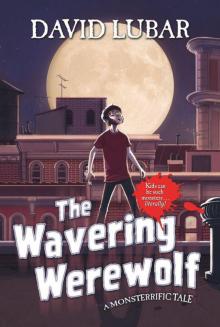 The Wavering Werewolf: A Monsterrific Tale (Monsterrific Tales)
The Wavering Werewolf: A Monsterrific Tale (Monsterrific Tales) Dog Days
Dog Days Sophomores and Other Oxymorons
Sophomores and Other Oxymorons The Psychozone
The Psychozone My Rotten Life
My Rotten Life Invasion of the Road Weenies
Invasion of the Road Weenies In the Land of the Lawn Weenies
In the Land of the Lawn Weenies Wipeout of the Wireless Weenies
Wipeout of the Wireless Weenies Ghost Attack
Ghost Attack Check Out the Library Weenies
Check Out the Library Weenies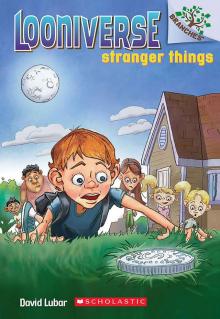 Looniverse #1: Stranger Things (A Branches Book)
Looniverse #1: Stranger Things (A Branches Book)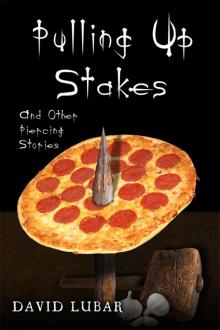 Pulling up Stakes and Other Piercing Stories
Pulling up Stakes and Other Piercing Stories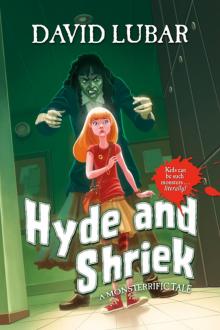 Hyde and Shriek
Hyde and Shriek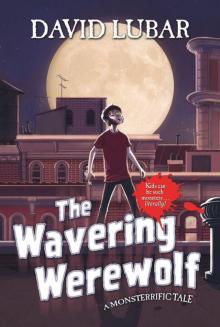 The Wavering Werewolf
The Wavering Werewolf Dead Guy Spy
Dead Guy Spy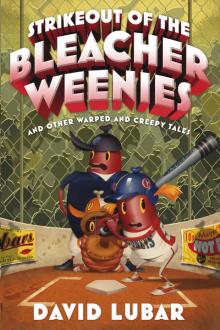 Strikeout of the Bleacher Weenies
Strikeout of the Bleacher Weenies The Big Stink
The Big Stink The Battle of the Red Hot Pepper Weenies
The Battle of the Red Hot Pepper Weenies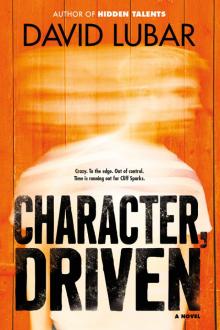 Character, Driven
Character, Driven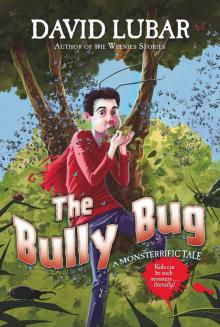 The Bully Bug
The Bully Bug Beware the Ninja Weenies
Beware the Ninja Weenies Extremities: Stories of Death, Murder, and Revenge
Extremities: Stories of Death, Murder, and Revenge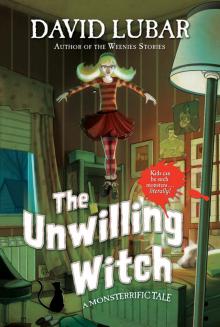 The Unwilling Witch
The Unwilling Witch Goop Soup
Goop Soup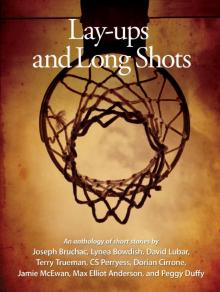 Lay-ups and Long Shots
Lay-ups and Long Shots The Gloomy Ghost
The Gloomy Ghost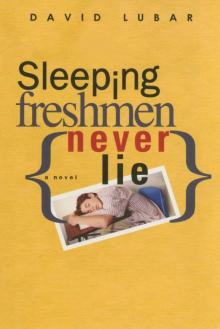 Sleeping Freshmen Never Lie
Sleeping Freshmen Never Lie Zero Tolerance Meets the Alien Death Ray and Other (Mostly) Inappropriate Stories
Zero Tolerance Meets the Alien Death Ray and Other (Mostly) Inappropriate Stories Attack of the Vampire Weenies
Attack of the Vampire Weenies Enter the Zombie
Enter the Zombie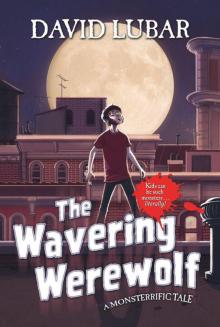 The Wavering Werewolf_A Monsterrific Tale
The Wavering Werewolf_A Monsterrific Tale The Curse of the Campfire Weenies
The Curse of the Campfire Weenies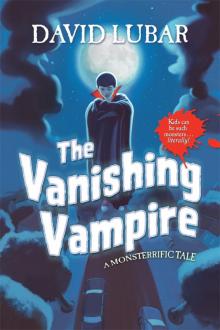 The Vanishing Vampire
The Vanishing Vampire